Two weeks ago, Substack announced they were rolling out verified bestseller badges.
I have 100+ paid subscribers, so my landing page has been granted one:
Same with my headlines:
Same with my comments:
Once I hit 1,000+ paid subscribers, this pale orange checkmark will upgrade to bright orange, like
:Once I hit 10,000+ paid subscribers, it will upgrade to bright blue, like
:I have the option to turn off the checkmark:
Let’s examine that option.
The Case Against The Checkmark
The Substack community *hates* the checkmarks… there was immediate backlash.
It’s hard for me to disagree with this general sentiment — writers are not merely “content creators,” they are artists, and the skill or worth of an artist is not properly measured by a popularity contest; just because Lil’ Wayne sells more records than Mozart, for example, doesn’t mean that Lil’ Wayne is a superior artist. In fact, the most highbrow writing will naturally only appeal to an elite few, while the most lowbrow writing will appeal to the lowest common denominator. In that sense, these new verification badges are a race towards the bottom.
Not to mention that the gamification aspect of these badges is just… gauche. Would Nietzsche submit himself to “gamification”? Would Hunter S. Thompson? Would Kierkegaard? Would Hemmingway? Would Bukowski?
In August 2006, Grigori Perelman was offered the Fields Medal (basically the Nobel prize in math), but he declined the award, stating: "I'm not interested in money or fame; I don't want to be on display like an animal in a zoo." Perhaps Perelman was inspired by Sinclair Lewis, an author who declined the 1926 Pulitzer Prize, who wrote:
“All prizes, like all titles, are dangerous. The seekers for prizes tend to labor not for inherent excellence but for alien rewards: they tend to write this, or timorously to avoid writing that, in order to tickle the prejudices of a haphazard committee.
…
Between the Pulitzer Prizes … every compulsion is put upon writers to become safe, polite, obedient, and sterile. In protest, I declined election to the National Institute of Arts and Letters some years ago, and now I must decline the Pulitzer Prize.
I invite other writers to consider the fact that by accepting the prizes and approval of these vague institutions we are admitting their authority, publicly confirming them as the final judges of literary excellence, and I inquire whether any prize is worth that subservience.”
Alpha.
Again, hard for me to point out any flaws with Perelman’s or Lewis’ logic here. I am jealous of their resolve.
Perhaps the most salient point, though — that which would make me a hypocrite — is that I deeply resented/hated the blue-check elites on Twitter for the past several years. They acted like their blue-check made them better than everyone, that they were “above” the masses somehow, and this elitist spirit fundamentally conflicts with the populist spirit of Karlstack. Who am I to put myself in a class “above” anyone else’s Substack?
Verification badges on Substack engender a winner-take-all dynamic where the rich get richer, and the poor stay poor… the exact same dynamic that plays out on Twitter, Instagram, TikTok, etc. Substack had a chance to do something fresh and different, but chose the default social media path, chose to highlight the already-big names at the expense of new/unknown/obscure authors. This is an elitist caste system, and it’s especially puzzling and off-brand because Substack has long portrayed themselves as champions of the little guy.
The Case For The Checkmark
The difference between a Substack badge and a Pulitzer Prize, Fields Medal, or even an old-school Twitter blue-check is that while the latter are bestowed by subjective committees, the former is decided by people voting with their wallets. The only way to earn a Substack badge is to get 100 people to pay for your writing. So, in that sense, if I kept the badge I would still be a “Substack of the people” because the people are voting to support it.
Substack CEO Chris Best describes this dynamic as follows:






On one hand, he makes a good point. On the other hand, what he fails to mention is that by promoting writers who make the most money, Substack is simply maximizing their own revenues. It’s easy to be cynical, then, about the prospect of him doing this for philosophical reasons rather than fiduciary reasons.
Lucily, I’m a beneficiary of this fiduciary goodwill. Over the long-term I am sure that being on the bestseller list will be a boon to Karlstack’s growth. Social proof works. One of the best ways to make more money is to tell people you’re already making money.
This is obviously a good thing for me because I’m trying to earn a living as a writer, so any accelerated growth is more than welcome. It’s easy for Grigori Perelman to decline a $1 million prize when he has a well-paying gig as a university professor; it’s harder for me to turn down a few extra subscribers when I am already a starving artist.
You could argue that I put in the work, so I deserve the checkmark, and I should even feel proud of it. I grinded in obscurity from 0 subscribers to where I am today simply by writing hundreds of articles, putting in thousands of hours of work, teaching myself to be a better writer, and doing all the marketing myself.
The grim reality of the writing world — that nobody who loudly complains about the checkmark wants to admit to themselves — is that most writers are not popular for a reason: most writers are bad, or write about stuff that nobody cares about. Why would Substack want to promote bad or uninteresting writers? That would just drive readers away from the platform.
99% of Substackers will never achieve 10 paid subscribers; let alone 100 paid subscribers… but among those 99%, I get the sense that there aren’t… exactly… too many… Hemmingway diamonds lost in the rough. At some point, if you have a tiny audience after years of hard work, it’s your fault. The cream tends to rise to the top.
What I’ve noticed about the new generation of Substack writers is that they seem to expect that the Substack head office should funnel them a constant stream of new subscribers just for showing up. They see big/established accounts being beneficiaries of the powerful network effect, and they feel entitled to the same network effect. Guess what: you shouldn’t rely on Substack, you should only ever rely on yourself. You should only ever view subscribers gained via the network effect as a nice little bonus on top.
Here is my advice to accounts that haven’t earned a verification badge yet but feel they have the skill/potential/ability to deserve one: rather than complain about those who have earned one, simply work harder and write better articles. Pull yourself up by your bootstraps. That’s what I did. Yeah, it’s unpleasant and requires toiling away for years in obscurity. Did you think becoming a famous writer was going to be easy? Get back to work and stop complaining. Life isn’t fair.
Conclusion
I’m on the fence… I don’t know… maybe I’m overthinking it.
What do you think?

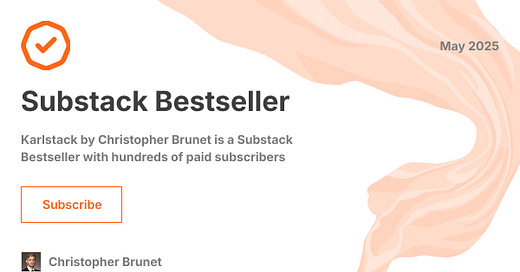



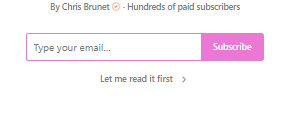


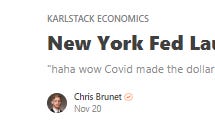











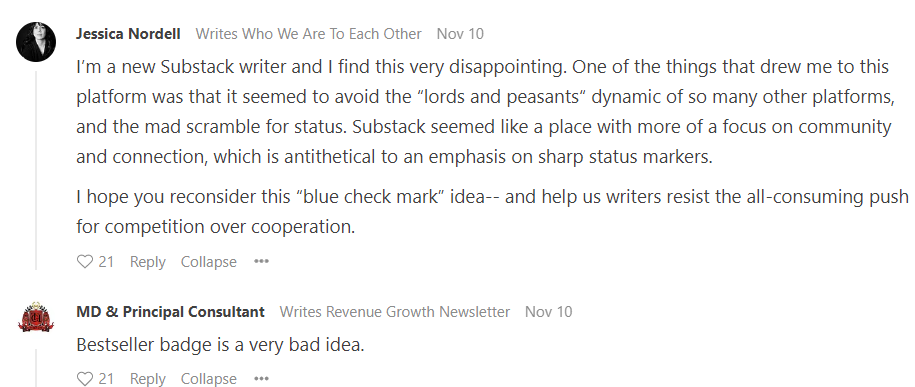

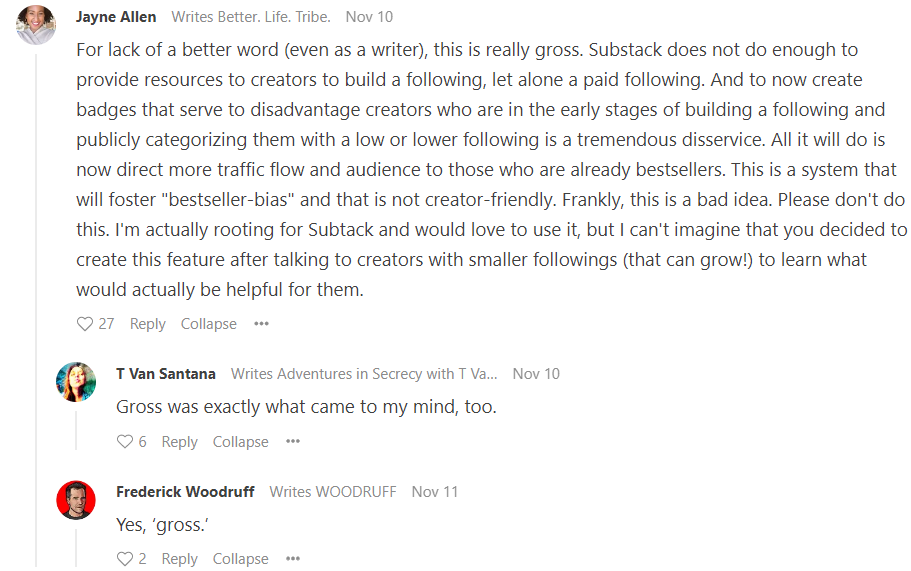
Keep it. Use every bit of leverage you have to become better known.
I like the reference to Sinclair Lewis, a little-known writer who should be better known. He did accept the Nobel for Literature in 1930 though.
Hemingway disdained Lewis's writing and said this of his appearance: "His face was a piece of old liver, shot squarely with a #7 shot at twenty yards."
Edit PS It's good that you are suspicious of external validation. That's a real trap. Lewis the writer was aware of this, Hemingway not so much. He fell victim to his own image.
Oh heck don't over-agitate yourself here.
Tiny little invisibles like me wouldn't be able to publish *at all* without the big-name draws making all them bucks for Substack. Those prestige accounts are dropping just enough crumbs on the table to let us itty bitty mice nibble on bits of cake.
Some grim reality here for the purportedly pure-of-heart? The minute you turn on paid subscriptions, you *are* thinking always, at some level or another of brainpower, about how to keep them come renewal time, and how to attract more. You can never again write exactly what you want in the blithe freedom of the unowned.
It's OK. You think Jane Austen or Adam Smith didn't get grief from their publishers about what the market wanted and what was worth paying the typesetters to set under the smoky glare of the midnight oil?
It's only the independently wealthy set who needn't care about publicity and hierarchies.
You're doing good here, and just think of that checkmark as a party favor if you want to keep your head screwed on right, going forward.
Substack is a business. It's not a heroic Ent of the Interwebs saving civilization. I mean, hasn't everyone accepting Stripe payment processing already sold out, or something? (Just only slightly kidding.)
I'm glad to be able to read you. You're a great enjoyment. Don't sweat nuthin'.
[edited for spelling. I'd never want to *red* you!]